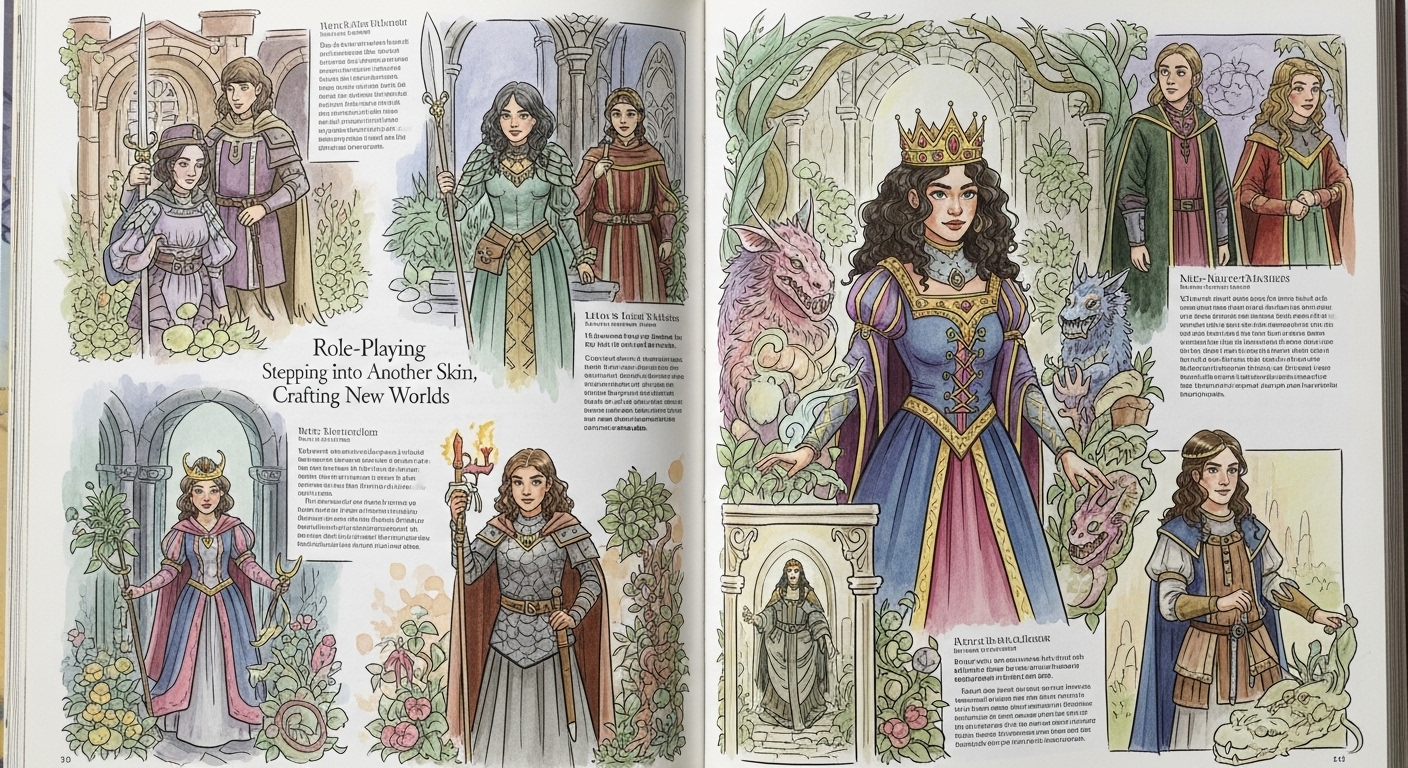In a world brimming with digital screens and passive entertainment, there’s a unique, deeply engaging activity that invites us to actively participate, to imagine ourselves in different shoes, and to collectively build narratives: role-playing. More than just a game, role-playing is a journey of shared storytelling, creative expression, and profound social interaction that spans ancient traditions to cutting-edge virtual realities. Here in Faisalabad, like in communities worldwide, the allure of crafting and experiencing alternative realities continues to draw enthusiasts.
What is Role-Playing? The Art of Assuming a Persona
At its core, role-playing involves assuming the identity of a character (a “role”) and acting out their experiences within a fictional setting. It’s about making decisions as that character, interacting with a simulated environment, and shaping a narrative that unfolds collaboratively. This fundamental concept manifests in various forms:
- Character Immersion: Players think, speak, and act as if they are their chosen character, embracing their motivations, flaws, and unique perspective.
- Collaborative Storytelling: Unlike passive consumption, role-playing is an active, often improvisational, process where the actions and decisions of all participants contribute to the evolving plot.
- Fictional Worlds: Role-playing takes place within a defined (though often flexible) setting – be it a fantastical land of dragons and magic, a futuristic sci-fi galaxy, a gritty detective noir city, or a historical drama.
- Rules and Systems (Often): While some role-playing is free-form, many forms use rule systems to provide structure, resolve conflicts (like combat), and introduce elements of chance (e.g., dice rolls).
The Diverse Landscape of Role-Playing
The world of role-playing is incredibly vast and continues to expand, catering to a wide array of interests and preferences:
- Tabletop Role-Playing Games (TTRPGs): This is arguably the most traditional and iconic form. Players gather around a table (or online), using dice, character sheets, and their imaginations. One player, often called the Game Master (GM) or Dungeon Master (DM), describes the world and its inhabitants, arbitrates rules, and presents challenges, while the other players portray their characters.
- Examples: Dungeons & Dragons (D&D), Call of Cthulhu, Pathfinder, Cyberpunk RED. TTRPGs foster deep character development and intricate plot lines.
- Live-Action Role-Playing (LARP): Players physically embody their characters in real-world settings, often with costumes, props, and simulated environments. LARPs can range from small, intimate murder mysteries to large-scale fantasy battles with hundreds of participants.
- Role-Playing Video Games (RPGs): A massively popular genre in the digital world, where players control a character (or party of characters) and make choices that influence the story and character development. RPGs often feature intricate skill trees, item customization, and expansive open worlds.
- Examples: The Elder Scrolls series (Skyrim), Final Fantasy series, The Witcher 3, Baldur’s Gate 3, Mass Effect.
- Online Role-Playing (RP) and MMORPGs: Many online communities and games feature dedicated role-playing servers or channels where players interact in character. Massively Multiplayer Online Role-Playing Games (MMORPGs) allow thousands of players to inhabit persistent virtual worlds.
- Examples: World of Warcraft, Final Fantasy XIV, Grand Theft Auto V RP servers.
- Educational and Therapeutic Role-Playing: Role-playing techniques are used in fields like education (e.g., simulating historical events, practicing public speaking), therapy (e.g., rehearsing social interactions, exploring emotions), and corporate training (e.g., customer service scenarios).
- Forum and Play-by-Post Role-Playing: Storytelling unfolds asynchronously through written posts on forums or dedicated platforms, allowing for detailed character development and collaborative writing.
The Profound Benefits of Stepping into a Role
The appeal of role-playing extends far beyond mere entertainment, offering a wealth of developmental and social benefits:
- Boosts Creativity and Imagination: Role-playing demands imaginative thinking to visualize worlds, embody characters, and devise solutions to problems.
- Enhances Problem-Solving Skills: Players must think critically and strategically to navigate challenges and achieve objectives.
- Improves Communication and Social Skills: Collaborative storytelling fosters active listening, negotiation, empathy, and effective verbal (and written) communication.
- Develops Empathy: By stepping into the shoes of diverse characters, players gain insights into different perspectives and motivations.
- Builds Confidence: Successfully portraying a character and contributing to a shared story can significantly boost self-esteem.
- Reduces Stress and Provides Escape: Role-playing offers a healthy outlet for stress and a temporary escape into fantastical worlds.
- Fosters Community: Role-playing often creates strong bonds among participants, forming vibrant communities built around shared interests and creative pursuits.
- Promotes Adaptability and Improvisation: Players frequently need to think on their feet and adjust to unexpected turns in the narrative.
The Future of Role-Playing: Blurring Realities
As of mid-2025, role-playing is experiencing a renaissance, particularly driven by:
- Digital Accessibility: Online platforms and tools make it easier than ever for people to connect and play TTRPGs from anywhere in the world.
- Technological Integration: Virtual tabletops, AI-powered tools for GMs (e.g., for generating content or NPCs), and increasingly sophisticated graphics in video game RPGs are enhancing immersion.
- Streaming and Actual Plays: The popularity of TTRPG actual play shows (where groups livestream their games) on platforms like Twitch and YouTube has introduced millions to the hobby.
- Increased Diversity and Inclusivity: The role-playing community is actively working towards more inclusive narratives, character options, and safer spaces for all participants.
- Transmedia Storytelling: Role-playing elements are increasingly crossing over into other forms of entertainment, from interactive movies to immersive theater.
Whether it’s the simple joy of inhabiting a character in a shared story, the strategic depth of a complex RPG, or the thrill of live-action immersion, role-playing offers a unique and powerful way to connect, create, and explore the boundless realms of imagination. It is, and will remain, a vital and ever-evolving form of human expression.

